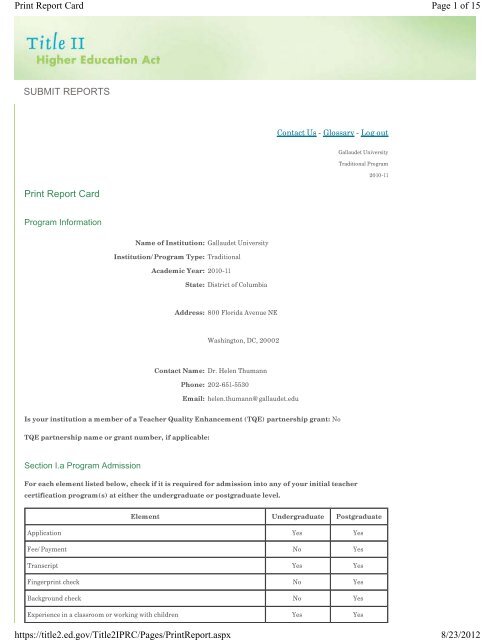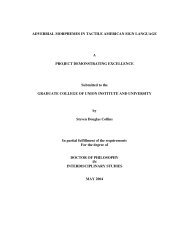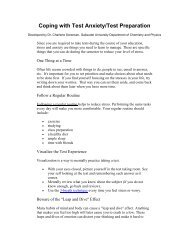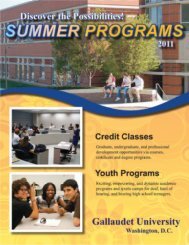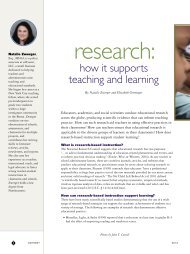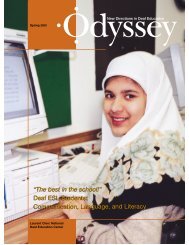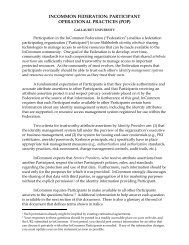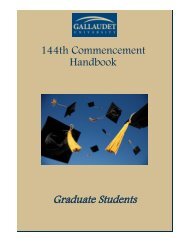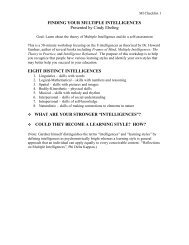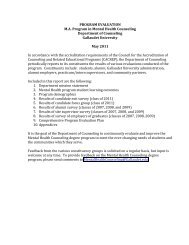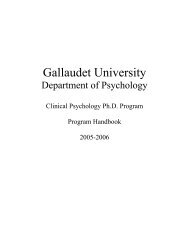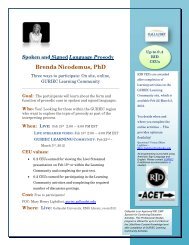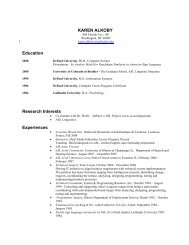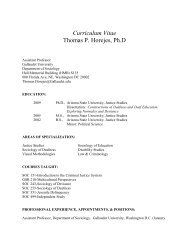Title II Higher Education Act Report Card - Gallaudet University
Title II Higher Education Act Report Card - Gallaudet University
Title II Higher Education Act Report Card - Gallaudet University
You also want an ePaper? Increase the reach of your titles
YUMPU automatically turns print PDFs into web optimized ePapers that Google loves.
Print <strong>Report</strong> <strong>Card</strong><br />
SUBMIT REPORTS<br />
Print <strong>Report</strong> <strong>Card</strong><br />
Program Information<br />
Name of Institution: <strong>Gallaudet</strong> <strong>University</strong><br />
Institution/Program Type: Traditional<br />
Academic Year: 2010-11<br />
State: District of Columbia<br />
Address: 800 Florida Avenue NE<br />
Washington, DC, 20002<br />
Contact Name: Dr. Helen Thumann<br />
Phone: 202-651-5530<br />
Email: helen.thumann@gallaudet.edu<br />
Contact Us - Glossary - Log out<br />
Is your institution a member of a Teacher Quality Enhancement (TQE) partnership grant: No<br />
TQE partnership name or grant number, if applicable:<br />
Section I.a Program Admission<br />
For each element listed below, check if it is required for admission into any of your initial teacher<br />
certification program(s) at either the undergraduate or postgraduate level.<br />
<strong>Gallaudet</strong> <strong>University</strong><br />
Traditional Program<br />
Element Undergraduate Postgraduate<br />
Application Yes Yes<br />
Fee/Payment No Yes<br />
Transcript Yes Yes<br />
Fingerprint check No Yes<br />
Background check No Yes<br />
Experience in a classroom or working with children Yes Yes<br />
https://title2.ed.gov/<strong>Title</strong>2IPRC/Pages/Print<strong>Report</strong>.aspx<br />
2010-11<br />
Page 1 of 15<br />
8/23/2012
Print <strong>Report</strong> <strong>Card</strong><br />
Minimum number of courses/credites/semester hours completed Yes No<br />
Minimum high school GPA No No<br />
Minimum undergraduate GPA Yes Yes<br />
Minimum GPA in content area coursework Yes Yes<br />
Minimum GPA in professional education coursework Yes Yes<br />
Minimum ACT score No No<br />
Minimum SAT score No No<br />
Minimum GRE score No No<br />
Minimum basic skills test score Yes Yes<br />
Subject area/academic content test or other subject matter verification Yes Yes<br />
Recommendation(s) Yes Yes<br />
Essay or personal statement Yes Yes<br />
Interview Yes No<br />
Resume Yes No<br />
Bachelor's degree or higher No Yes<br />
Job offer from school/district No No<br />
Personality test No No<br />
Other (specify: American Sign Language Proficiency Interview ) No Yes<br />
Provide a link to your website where additional information about admissions requirements can be<br />
found:<br />
http://www.gallaudet.edu/education.html<br />
Indicate when students are formally admitted into your initial teacher certification program:<br />
Other varies by student and program<br />
Does your initial teacher certification program conditionally admit students? Yes<br />
Please provide any additional about or exceptions to the admissions information provided above:<br />
The Undergraduate program does admit students with conditions that can include: showing improvement in GPA by a<br />
specified time, proof of Praxis scores, obtaining additional work/volunteer experience with children or verification of<br />
admission to the content major for Secondary <strong>Education</strong> programs. The postgraduate program does admit students with<br />
the condition that they complete some pre-requisite coursework, satisfy a background check, meet minimum GPA,provide<br />
proof of Praxis scores or provide proof of completed Undergraduate degree.<br />
Section I.b Program Enrollment<br />
Provide the number of students in the teacher preparation program in the following categories. Note that<br />
you must report on the number of students by ethnicity and race separately. Individuals who are non-<br />
Hispanic/Latino will be reported in one of the race categories. Also note that individuals can belong to one<br />
or more racial groups, so the sum of the members of each racial category may not necessarily add up to<br />
the total number of students enrolled.<br />
Total number of students enrolled in 2010-11: 83<br />
Unduplicated number of males enrolled in 2010-11: 17<br />
https://title2.ed.gov/<strong>Title</strong>2IPRC/Pages/Print<strong>Report</strong>.aspx<br />
Page 2 of 15<br />
8/23/2012
Print <strong>Report</strong> <strong>Card</strong><br />
Unduplicated number of females enrolled in 2010-11: 66<br />
Ethnicity<br />
2010-11 Number enrolled<br />
Hispanic/Latino of any race: 3<br />
Race<br />
American Indian or Alaska Native: 0<br />
Asian: 5<br />
Black or African American: 6<br />
Native Hawaiian or Other Pacific Islander: 0<br />
White: 64<br />
Two or more races: 2<br />
Section I.c Supervised Experience<br />
Provide the following information about supervised clinical experience in 2010-11.<br />
Average number of clock hours required prior to student teaching 87<br />
Average number of clock hours required for student teaching 350<br />
Number of full-time equivalent faculty in supervised clinical experience during this academic year 10<br />
Number of full-time equivalent adjunct faculty in supervised clinical experience during this academic year (IHE<br />
and PreK-12 staff)<br />
Number of students in supervised clinical experience during this academic year 77<br />
Please provide any additional information about or descriptions of the supervised clinical experiences:<br />
The number of students in supervised clinical experience may count the same students twice in one year as a student could<br />
go from one practicum to another or from practicum to student teaching in the academic year. In our Undergraduate and<br />
Graduate programs we have General Ed licensure programs (ECE, Elementary, Secondary). These students (the majority of<br />
whom are Deaf or Hard of Hearing) do their placements in local-Metropolitan DC- Public/Private schools with interpreters.<br />
The Graduate program has a Deaf <strong>Education</strong> licensure program. These students do their practicum placements in the DC<br />
Metro area but their student teaching is typically outside of the DC area (Texas, New Mexico, etc). Many of these Deaf Ed<br />
graduate students are getting their 2nd initial license (after completing a General Ed licensure program).<br />
Section I.d Teachers Prepared by Subject Area<br />
Please provide the number of teachers prepared by subject area for academic year 2010-11. For the<br />
purposes of this section, number prepared means the number of program completers. "Subject area"<br />
refers to the subject area(s) an individual has been prepared to teach. An individual can be counted in<br />
more than one subject area. If no individuals were prepared in a particular subject area, please leave that<br />
cell blank. (§205(b)(1)(H))<br />
<strong>Education</strong> - General<br />
Subject Area Number Prepared<br />
Teacher <strong>Education</strong> - Special <strong>Education</strong> 12<br />
https://title2.ed.gov/<strong>Title</strong>2IPRC/Pages/Print<strong>Report</strong>.aspx<br />
0<br />
Page 3 of 15<br />
8/23/2012
Print <strong>Report</strong> <strong>Card</strong><br />
Teacher <strong>Education</strong> - Early Childhood <strong>Education</strong> 0<br />
Teacher <strong>Education</strong> - Elementary <strong>Education</strong> 3<br />
Teacher <strong>Education</strong> - Junior High/Intermediate/Middle School <strong>Education</strong><br />
Teacher <strong>Education</strong> - Secondary <strong>Education</strong> 2<br />
Teacher <strong>Education</strong> - Multiple Levels<br />
Teacher <strong>Education</strong> - Agriculture<br />
Teacher <strong>Education</strong> - Art<br />
Teacher <strong>Education</strong> - Business<br />
Teacher <strong>Education</strong> - English/Language Arts 1<br />
Teacher <strong>Education</strong> - Foreign Language<br />
Teacher <strong>Education</strong> - Health<br />
Teacher <strong>Education</strong> - Family and Consumer Sciences/Home Economics<br />
Teacher <strong>Education</strong> - Technology Teacher <strong>Education</strong>/Industrial Arts<br />
Teacher <strong>Education</strong> - Mathematics 1<br />
Teacher <strong>Education</strong> - Music<br />
Teacher <strong>Education</strong> - Physical <strong>Education</strong> and Coaching<br />
Teacher <strong>Education</strong> - Reading<br />
Teacher <strong>Education</strong> - Science Teacher <strong>Education</strong>/General Science<br />
Teacher <strong>Education</strong> - Social Science<br />
Teacher <strong>Education</strong> - Social Studies<br />
Teacher <strong>Education</strong> - Technical <strong>Education</strong><br />
Teacher <strong>Education</strong> - Computer Science<br />
Teacher <strong>Education</strong> - Biology<br />
Teacher <strong>Education</strong> - Chemistry<br />
Teacher <strong>Education</strong> - Drama and Dance<br />
Teacher <strong>Education</strong> - French<br />
Teacher <strong>Education</strong> - German<br />
Teacher <strong>Education</strong>- History<br />
Teacher <strong>Education</strong> - Physics<br />
Teacher <strong>Education</strong> - Spanish<br />
Teacher <strong>Education</strong> - Speech<br />
Teacher <strong>Education</strong> - Geography<br />
Teacher <strong>Education</strong> - Latin<br />
Teacher <strong>Education</strong> - Psychology<br />
Teacher <strong>Education</strong> - Earth Science<br />
Teacher <strong>Education</strong> - English as a Second Language<br />
Teacher <strong>Education</strong> - Bilingual, Multilingual, and Multicultural <strong>Education</strong><br />
https://title2.ed.gov/<strong>Title</strong>2IPRC/Pages/Print<strong>Report</strong>.aspx<br />
Page 4 of 15<br />
8/23/2012
Print <strong>Report</strong> <strong>Card</strong><br />
<strong>Education</strong> - Other<br />
Specify:<br />
Section I.d Teachers Prepared by Academic Major<br />
Please provide the number of teachers prepared by academic major for academic year 2010-11. For the<br />
purposes of this section, number prepared means the number of program completers. "Academic major"<br />
refers to the actual major(s) declared by the program completer. An individual can be counted in more<br />
than one academic major. If no individuals were prepared in a particular academic major, please leave<br />
that cell blank. (§205(b)(1)(H))<br />
<strong>Education</strong> - General<br />
Academic Major Number Prepared<br />
Teacher <strong>Education</strong> - Special <strong>Education</strong> 12<br />
Teacher <strong>Education</strong> - Early Childhood <strong>Education</strong><br />
Teacher <strong>Education</strong> - Elementary <strong>Education</strong> 3<br />
Teacher <strong>Education</strong> - Junior High/Intermediate/Middle School <strong>Education</strong><br />
Teacher <strong>Education</strong> - Secondary <strong>Education</strong> 2<br />
Teacher <strong>Education</strong> - Agriculture<br />
Teacher <strong>Education</strong> - Art<br />
Teacher <strong>Education</strong> - Business<br />
Teacher <strong>Education</strong> - English/Language Arts<br />
Teacher <strong>Education</strong> - Foreign Language<br />
Teacher <strong>Education</strong> - Health<br />
Teacher <strong>Education</strong> - Family and Consumer Sciences/Home Economics<br />
Teacher <strong>Education</strong> - Technology Teacher <strong>Education</strong>/Industrial Arts<br />
Teacher <strong>Education</strong> - Mathematics<br />
Teacher <strong>Education</strong> - Music<br />
Teacher <strong>Education</strong> - Physical <strong>Education</strong> and Coaching<br />
Teacher <strong>Education</strong> - Reading<br />
Teacher <strong>Education</strong> - Science<br />
Teacher <strong>Education</strong> - Social Science<br />
Teacher <strong>Education</strong> - Social Studies<br />
Teacher <strong>Education</strong> - Technical <strong>Education</strong><br />
Teacher <strong>Education</strong> - Computer Science<br />
Teacher <strong>Education</strong> - Biology<br />
Teacher <strong>Education</strong> - Chemistry<br />
Teacher <strong>Education</strong> - Drama and Dance<br />
Teacher <strong>Education</strong> - French<br />
Teacher <strong>Education</strong> - German<br />
https://title2.ed.gov/<strong>Title</strong>2IPRC/Pages/Print<strong>Report</strong>.aspx<br />
Page 5 of 15<br />
8/23/2012
Print <strong>Report</strong> <strong>Card</strong><br />
Teacher <strong>Education</strong> - History<br />
Teacher <strong>Education</strong> - Physics<br />
Teacher <strong>Education</strong> - Spanish<br />
Teacher <strong>Education</strong> - Speech<br />
Teacher <strong>Education</strong> - Geography<br />
Teacher <strong>Education</strong> - Latin<br />
Teacher <strong>Education</strong> - Psychology<br />
Teacher <strong>Education</strong> - Earth Science<br />
Teacher <strong>Education</strong> - English as a Second Language<br />
Teacher <strong>Education</strong> - Bilingual, Multilingual, and Multicultural <strong>Education</strong><br />
<strong>Education</strong> - Curriculum and Instruction<br />
<strong>Education</strong> - Social and Philosophical Foundations of <strong>Education</strong><br />
Liberal Arts/Humanities<br />
Psychology<br />
Social Sciences<br />
Anthropology<br />
Economics<br />
Geography and Cartography<br />
Political Science and Government<br />
Sociology<br />
Visual and Performing Arts<br />
History<br />
Foreign Languages<br />
Family and Consumer Sciences/Human Sciences<br />
English Language/Literature 1<br />
Philosophy and Religious Studies<br />
Agriculture<br />
Communication or Journalism<br />
Engineering<br />
Biology<br />
Mathematics and Statistics 1<br />
Physical Sciences<br />
Astronomy and Astrophysics<br />
Atmospheric Sciences and Meteorology<br />
Chemistry<br />
Geological and Earth Sciences/Geosciences<br />
Physics<br />
https://title2.ed.gov/<strong>Title</strong>2IPRC/Pages/Print<strong>Report</strong>.aspx<br />
Page 6 of 15<br />
8/23/2012
Print <strong>Report</strong> <strong>Card</strong><br />
Business/Business Administration/Accounting<br />
Computer and Information Sciences<br />
Other<br />
Specify:<br />
Section I.e Program Completers<br />
Provide the total number of initial teacher certification preparation program completers in each of the<br />
following academic years:<br />
2010-11: 17<br />
2009-10: 10<br />
2008-09: 10<br />
Section <strong>II</strong>. Annual Goals<br />
Each institution of higher education (IHE) that conducts a traditional teacher preparation program<br />
(including programs that offer any ongoing professional development programs) or alternative routes to<br />
state certification or licensure program, and that enrolls students receiving Federal assistance under this<br />
<strong>Act</strong>, shall set annual quantifiable goals for increasing the number of prospective teachers trained in<br />
teacher shortage areas designated by the Secretary or by the state educational agency, including<br />
mathematics, science, special education, and instruction of limited English proficient students. IHEs that<br />
do not have a teacher preparation program in one or more of the areas listed below can enter NA for the<br />
area(s) in which the IHE does not have that program.<br />
Teacher shortage<br />
area<br />
Mathematics<br />
Science<br />
Academic year: 2011-12<br />
Goal: 2<br />
Goal met? No<br />
Goal for increasing prospective teachers trained<br />
Description of strategies used to achieve goal:<br />
In 2010-11 we had one Program Completer in Secondary Mathematics. During the 2010-2011<br />
academic year the <strong>Education</strong> Department worked with the Math Department to provide an elective<br />
course focused on passing the Praxis <strong>II</strong> content exam.<br />
Description of steps to improve performance in meeting goal or lessons learned in<br />
meeting goal:<br />
Because our biggest barrier at this point is the Praxis <strong>II</strong> content exam, we focus our efforts on<br />
improving the pass rate. This academic year we were able to find a tutor for our Math <strong>Education</strong><br />
majors. We also have worked with the Math Department to try to insure timely application to the<br />
<strong>Education</strong> programs and shared information.<br />
Academic year: 2011-12<br />
Goal: 0<br />
Goal met? No<br />
https://title2.ed.gov/<strong>Title</strong>2IPRC/Pages/Print<strong>Report</strong>.aspx<br />
Page 7 of 15<br />
8/23/2012
Print <strong>Report</strong> <strong>Card</strong><br />
Special education<br />
Instruction of<br />
limited English<br />
proficient students<br />
NA<br />
Description of strategies used to achieve goal:<br />
This year we had a student who was in Secondary Biology who did not graduate as a program<br />
completer as he was not able to complete the required performance assessments. We continue to<br />
have low enrollment in this program. We have met with representatives from each of the Science<br />
majors on campus in an effort to improve this.<br />
Description of steps to improve performance in meeting goal or lessons learned in<br />
meeting goal:<br />
We hope by adding the additional content areas in the sciences we will be able to increase our<br />
enrollment in the Secondary Sciences program. We are also working with the Chemistry<br />
Department Faculty to address increasing enrollment. We have also been in discussions with STEM<br />
faculty about developing a Noyce Grant application to support STEM/<strong>Education</strong> majors. This is a<br />
long term goal for the program.<br />
Academic year: 2010-12<br />
Goal: 10<br />
Goal met? Yes<br />
Description of strategies used to achieve goal:<br />
We had 12 Deaf Ed program completers this year. Three had previous General <strong>Education</strong> licensure<br />
or program completion. We have worked to clarify our program recruitment and increase our<br />
enrollment in the dual license programs.<br />
Description of steps to improve performance in meeting goal or lessons learned in<br />
meeting goal:<br />
We had 12 program completers in our k - 12 Deaf <strong>Education</strong> (Special <strong>Education</strong>) programs. By<br />
requiring students to pass the Praxis I (and or equivalent) exam early in the program (or prior to<br />
admission) we have been able to increase our program completion rate in the Graduate Program.<br />
Academic year: 2011-12<br />
Goal: NA<br />
Goal met?<br />
Description of strategies used to achieve goal:<br />
Description of steps to improve performance in meeting goal or lessons learned in<br />
meeting goal:<br />
Academic year: 2011-12<br />
Goal: NA<br />
Goal met?<br />
Description of strategies used to achieve goal:<br />
Description of steps to improve performance in meeting goal or lessons learned in<br />
meeting goal:<br />
https://title2.ed.gov/<strong>Title</strong>2IPRC/Pages/Print<strong>Report</strong>.aspx<br />
Page 8 of 15<br />
8/23/2012
Print <strong>Report</strong> <strong>Card</strong><br />
Provide any additional comments, exceptions and explanations below:<br />
Over the past several years the programs have begun requiring students to pass Praxis I exams for entry into student<br />
teaching (and for graduate students passing the Praxis I and <strong>II</strong> Content Knowledge exam is a requirement for admission).<br />
This resulted in the number of candidates we expected to go into Student Teaching and graduating from the program with<br />
licensure recommendations not matching the goals we had set. The majority of our students who are struggling to pass the<br />
Praxis exams are struggling with the Praxis I exams. To address this, we have provided professional development<br />
workshops, tutoring (both through our on-campus tutoring center and the department), begun incorporating Praxis 1<br />
practice and study into our Introduction to <strong>Education</strong> courses and are providing free study materials to applicants and<br />
students. Additionally this year (2011-12) DC has begun to accept alternative Basic Skills tests (ACT, GRE, SAT, instead of<br />
just the Praxis). We believe this will help with recruitment as many more students have taken the ACT or other equivalent<br />
exam than the Praxis I exams.<br />
The one Praxis <strong>II</strong> Content Knowledge exam that our candidates do not do well on is the Praxis <strong>II</strong> Secondary Mathematics<br />
Content Knowledge exam. During the 2011-12 academic year we worked with the Math Department on campus to provide<br />
tutoring for this exam and have begun to see some improvement.<br />
Section <strong>II</strong>. Assurances<br />
Please indicate whether your institution is in compliance with the following assurances.<br />
Training provided to prospective teachers responds to the identified needs of the local educational<br />
agencies or States where the institution’s graduates are likely to teach, based on past hiring and<br />
recruitment trends.<br />
Yes<br />
Training provided to prospective teachers is closely linked with the needs of schools and the instructional<br />
decisions new teachers face in the classroom.<br />
Yes<br />
Prospective special education teachers receive coursework in core academic subjects and receive training<br />
in providing instruction in core academic subjects.<br />
Yes<br />
General education teachers receive training in providing instruction to children with disabilities.<br />
Yes<br />
General education teachers receive training in providing instruction to limited English proficient<br />
students.<br />
Yes<br />
General education teachers receive training in providing instruction to children from low-income<br />
families.<br />
Yes<br />
Prospective teachers receive training on how to effectively teach in urban and rural schools, as applicable.<br />
Yes<br />
Describe your institution’s most successful strategies in meeting the assurances listed above:<br />
Our program provides preparation and training for teachers to work with all children and deaf/hard of hearing children<br />
with an emphasis on bilingual education (American Sign Language and English) and support for English Language<br />
Learners. Our program provides experiences in schools in the Metropolitan District of Columbia area. many of the schools<br />
we work with have a high number of low income families and are in an urban environment. All of our students in the<br />
undergraduate programs focus on General <strong>Education</strong> for their licensure area and many of those students go on to our<br />
Graduate program in Deaf <strong>Education</strong>. Beginning in the fall 2010, we began new graduate majors that allow candidates to<br />
https://title2.ed.gov/<strong>Title</strong>2IPRC/Pages/Print<strong>Report</strong>.aspx<br />
Page 9 of 15<br />
8/23/2012
Print <strong>Report</strong> <strong>Card</strong><br />
complete both a General <strong>Education</strong> and a Deaf <strong>Education</strong> license during their graduate course of study. We also continue to<br />
have our Deaf <strong>Education</strong> only graduate program (which requires those admitted to be eligible for a general education<br />
license). As a result all of the candidates who are recommended for a k - 12 Special <strong>Education</strong>: Deaf/Hard of Hearing<br />
license are also prepared to teach General <strong>Education</strong> content.<br />
Section <strong>II</strong>I. Assessment Rates<br />
Assessment code - Assessment name<br />
Test Company<br />
Group<br />
ETS0235 -BIOLOGY CONTENT KNOWLEDGE<br />
<strong>Education</strong>al Testing Service (ETS)<br />
Other enrolled students<br />
ETS0353 -ED OF EXCEPTIONAL STUDENTS: CORE CK<br />
<strong>Education</strong>al Testing Service (ETS)<br />
Other enrolled students<br />
ETS0353 -ED OF EXCEPTIONAL STUDENTS: CORE CK<br />
<strong>Education</strong>al Testing Service (ETS)<br />
All program completers, 2010-11<br />
ETS0353 -ED OF EXCEPTIONAL STUDENTS: CORE CK<br />
<strong>Education</strong>al Testing Service (ETS)<br />
All program completers, 2009-10<br />
ETS0353 -ED OF EXCEPTIONAL STUDENTS: CORE CK<br />
<strong>Education</strong>al Testing Service (ETS)<br />
All program completers, 2008-09<br />
ETS0021 -EDUCATION OF YOUNG CHILDREN<br />
<strong>Education</strong>al Testing Service (ETS)<br />
Other enrolled students<br />
ETS0021 -EDUCATION OF YOUNG CHILDREN<br />
<strong>Education</strong>al Testing Service (ETS)<br />
All program completers, 2010-11<br />
ETS0021 -EDUCATION OF YOUNG CHILDREN<br />
<strong>Education</strong>al Testing Service (ETS)<br />
All program completers, 2009-10<br />
ETS0012 -ELEM ED CONTENT AREA EXERCISES<br />
<strong>Education</strong>al Testing Service (ETS)<br />
Other enrolled students<br />
ETS0012 -ELEM ED CONTENT AREA EXERCISES<br />
<strong>Education</strong>al Testing Service (ETS)<br />
All program completers, 2010-11<br />
ETS0012 -ELEM ED CONTENT AREA EXERCISES<br />
<strong>Education</strong>al Testing Service (ETS)<br />
All program completers, 2009-10<br />
https://title2.ed.gov/<strong>Title</strong>2IPRC/Pages/Print<strong>Report</strong>.aspx<br />
Number Avg. Number Pass<br />
taking scaled passing rate<br />
tests score tests (%)<br />
1<br />
State<br />
Average<br />
pass<br />
rate<br />
(%)<br />
State<br />
Average<br />
scaled<br />
score<br />
1 100 168<br />
5 100 174<br />
3 100 176<br />
3 99 178<br />
1 90 183<br />
1 93 185<br />
1 93 184<br />
5 95 155<br />
1 99 160<br />
3 99 161<br />
Page 10 of 15<br />
8/23/2012
Print <strong>Report</strong> <strong>Card</strong><br />
ETS0012 -ELEM ED CONTENT AREA EXERCISES<br />
<strong>Education</strong>al Testing Service (ETS)<br />
All program completers, 2008-09<br />
ETS0014 -ELEMENTARY ED CONTENT KNOWLEDGE<br />
<strong>Education</strong>al Testing Service (ETS)<br />
Other enrolled students<br />
ETS0014 -ELEMENTARY ED CONTENT KNOWLEDGE<br />
<strong>Education</strong>al Testing Service (ETS)<br />
All program completers, 2010-11<br />
ETS0014 -ELEMENTARY ED CONTENT KNOWLEDGE<br />
<strong>Education</strong>al Testing Service (ETS)<br />
All program completers, 2009-10<br />
ETS0014 -ELEMENTARY ED CONTENT KNOWLEDGE<br />
<strong>Education</strong>al Testing Service (ETS)<br />
All program completers, 2008-09<br />
ETS0041 -ENG LANG LIT COMP CONTENT<br />
KNOWLEDGE<br />
<strong>Education</strong>al Testing Service (ETS)<br />
Other enrolled students<br />
ETS0041 -ENG LANG LIT COMP CONTENT<br />
KNOWLEDGE<br />
<strong>Education</strong>al Testing Service (ETS)<br />
All program completers, 2009-10<br />
ETS0043 -ENG LANG LIT COMP PEDAGOGY<br />
<strong>Education</strong>al Testing Service (ETS)<br />
Other enrolled students<br />
ETS0043 -ENG LANG LIT COMP PEDAGOGY<br />
<strong>Education</strong>al Testing Service (ETS)<br />
All program completers, 2009-10<br />
ETS0234 -LIFE SCIENCE: PEDAGOGY<br />
<strong>Education</strong>al Testing Service (ETS)<br />
Other enrolled students<br />
ETS0065 -MATHEMATICS PEDAGOGY<br />
<strong>Education</strong>al Testing Service (ETS)<br />
Other enrolled students<br />
ETS0061 -MATHEMATICS: CONTENT KNOWLEDGE<br />
<strong>Education</strong>al Testing Service (ETS)<br />
Other enrolled students<br />
ETS0730 -PRAXIS I MATHEMATICS<br />
<strong>Education</strong>al Testing Service (ETS)<br />
Other enrolled students<br />
ETS0730 -PRAXIS I MATHEMATICS<br />
<strong>Education</strong>al Testing Service (ETS)<br />
All program completers, 2010-11<br />
https://title2.ed.gov/<strong>Title</strong>2IPRC/Pages/Print<strong>Report</strong>.aspx<br />
1 98 160<br />
5 98 164<br />
1 100 172<br />
3 98 172<br />
1 97 171<br />
2 100 172<br />
1 100 183<br />
2 77 154<br />
1 97 158<br />
1<br />
1<br />
2 88 161<br />
41 179 38 93 93 180<br />
10 181 10 100 94 181<br />
Page 11 of 15<br />
8/23/2012
Print <strong>Report</strong> <strong>Card</strong><br />
ETS0730 -PRAXIS I MATHEMATICS<br />
<strong>Education</strong>al Testing Service (ETS)<br />
All program completers, 2009-10<br />
ETS0730 -PRAXIS I MATHEMATICS<br />
<strong>Education</strong>al Testing Service (ETS)<br />
All program completers, 2008-09<br />
ETS0710 -PRAXIS I READING<br />
<strong>Education</strong>al Testing Service (ETS)<br />
Other enrolled students<br />
ETS0710 -PRAXIS I READING<br />
<strong>Education</strong>al Testing Service (ETS)<br />
All program completers, 2010-11<br />
ETS0710 -PRAXIS I READING<br />
<strong>Education</strong>al Testing Service (ETS)<br />
All program completers, 2009-10<br />
ETS0710 -PRAXIS I READING<br />
<strong>Education</strong>al Testing Service (ETS)<br />
All program completers, 2008-09<br />
ETS0720 -PRAXIS I WRITING<br />
<strong>Education</strong>al Testing Service (ETS)<br />
Other enrolled students<br />
ETS0720 -PRAXIS I WRITING<br />
<strong>Education</strong>al Testing Service (ETS)<br />
All program completers, 2010-11<br />
ETS0720 -PRAXIS I WRITING<br />
<strong>Education</strong>al Testing Service (ETS)<br />
All program completers, 2009-10<br />
ETS0720 -PRAXIS I WRITING<br />
<strong>Education</strong>al Testing Service (ETS)<br />
All program completers, 2008-09<br />
ETS0354 -SE CORE KNOWLEDGE & APPLICATIONS<br />
<strong>Education</strong>al Testing Service (ETS)<br />
Other enrolled students<br />
ETS0354 -SE CORE KNOWLEDGE & APPLICATIONS<br />
<strong>Education</strong>al Testing Service (ETS)<br />
All program completers, 2010-11<br />
Section <strong>II</strong>I. Summary Rates<br />
Group<br />
8 93 181<br />
4 96 182<br />
41 177 37 90 97 180<br />
10 178 10 100 100 181<br />
8 99 181<br />
4 99 182<br />
41 175 38 93 97 178<br />
10 177 10 100 100 179<br />
8 100 179<br />
4 100 179<br />
3 96 166<br />
3 100 174<br />
State<br />
Number Number Pass<br />
Average<br />
taking passing rate<br />
pass rate<br />
tests tests (%)<br />
(%)<br />
All program completers, 2010-11 10 10 100 95<br />
All program completers, 2009-10 8 91<br />
https://title2.ed.gov/<strong>Title</strong>2IPRC/Pages/Print<strong>Report</strong>.aspx<br />
Page 12 of 15<br />
8/23/2012
Print <strong>Report</strong> <strong>Card</strong><br />
All program completers, 2008-09 4 91<br />
All program completers, combined 3 academic years 22 22 100 100<br />
Section IV. Low-Performing<br />
Provide the following information about the approval or accreditation of your teacher preparation<br />
program.<br />
Is your teacher preparation program currently approved or accredited?<br />
Yes<br />
If yes, please specify the organization(s) that approved or accredited your program:<br />
State<br />
NCATE<br />
Is your teacher preparation program currently under a designation as "low-performing" by the state (as<br />
per section 207(a) of the HEA of 2008)?<br />
No<br />
Section V. Technology<br />
Does your program prepare teachers to:<br />
• integrate technology effectively into curricula and instruction<br />
Yes<br />
• use technology effectively to collect data to improve teaching and learning<br />
Yes<br />
• use technology effectively to manage data to improve teaching and learning<br />
Yes<br />
• use technology effectively to analyze data to improve teaching and learning<br />
Yes<br />
Provide a description of how your program prepares teachers to integrate technology effectively into<br />
curricula and instruction, and to use technology effectively to collect, manage, and analyze data in order<br />
to improve teaching and learning for the purpose of increasing student academic achievement. Include a<br />
description of how your program prepares teachers to use the principles of universal design for learning,<br />
as applicable. Include planning activities and a timeline if any of the four elements listed above are not<br />
currently in place.<br />
All of our candidates are required to demonstrate planning and instruction that includes technology. We also require our<br />
candidates to complete a number of Teacher Work Samples (both formatively and summatively) and in these Teacher Work<br />
Samples they must demonstrate the use of technology, gather data to improve teaching and learning, manage and analyze<br />
the data to demonstrate that they have made an impact on teaching and learning of K – 12 students.<br />
Section VI. Teacher Training<br />
Does your program prepare general education teachers to:<br />
• teach students with disabilities effectively<br />
Yes<br />
https://title2.ed.gov/<strong>Title</strong>2IPRC/Pages/Print<strong>Report</strong>.aspx<br />
Page 13 of 15<br />
8/23/2012
Print <strong>Report</strong> <strong>Card</strong><br />
• participate as a member of individualized education program teams<br />
Yes<br />
• teach students who are limited English proficient effectively<br />
Yes<br />
Provide a description of how your program prepares general education teachers to teach students with<br />
disabilities effectively, including training related to participation as a member of individualized education<br />
program teams, as defined in section 614(d)(1)(B) of the Individuals with Disabilities <strong>Education</strong> <strong>Act</strong>, and<br />
to effectively teach students who are limited English proficient. Include planning activities and a timeline<br />
if any of the three elements listed above are not currently in place.<br />
Since 1984 our Undergraduate programs have provided our students with a General <strong>Education</strong> licensure teacher<br />
preparation program. The majority of our undergraduates go on to a graduate program in Deaf or Special <strong>Education</strong> either<br />
at <strong>Gallaudet</strong> <strong>University</strong> or another university. Our program philosophy has been that all Special <strong>Education</strong> teachers need a<br />
strong background in general education.<br />
Currently our postgraduate Deaf <strong>Education</strong> program requires candidates without a license in General <strong>Education</strong> to take pre<br />
-requisites to attain fundamental knowledge and skills in teaching general education courses.<br />
In 2009 the Department of <strong>Education</strong> revised the postgraduate programs to add the ability to receive both a general<br />
education licensure and a k – 12 Special <strong>Education</strong> Deaf/Hard of haring licensure. This new program began in Fall 2010.<br />
Additionally all candidates who wish to receive just the k – 12 Special <strong>Education</strong>: Deaf/Hard of hearing license must<br />
demonstrate either a Bachelor’s degree in General <strong>Education</strong> or licensure in general education or a content area.<br />
The majority of our candidates plan to work with Deaf/hard of hearing students. Many Deaf/hard of hearing students meet<br />
the definition for limited English proficiency. So many of our literacy courses in both the undergraduate and postgraduate<br />
programs provide preparation in working with students who are limited English proficient.<br />
Additionally in our recent curriculum revisions we placed a particular emphasis on including working with students with<br />
disabilities in all of our course work. We also worked to infuse a bilingual education focus including a focus on working with<br />
students with limited English proficiency.<br />
Does your program prepare special education teachers to:<br />
• teach students with disabilities effectively<br />
Yes<br />
• participate as a member of individualized education program teams<br />
Yes<br />
• teach students who are limited English proficient effectively<br />
Yes<br />
Provide a description of how your program prepares special education teachers to teach students with<br />
disabilities effectively, including training related to participation as a member of individualized education<br />
program teams, as defined in section 614(d)(1)(B) of the Individuals with Disabilities <strong>Education</strong> <strong>Act</strong>, and<br />
to effectively teach students who are limited English proficient. Include planning activities and a timeline<br />
if any of the three elements listed above are not currently in place.<br />
All candidates are required to take at least one course focused on working with students with disabilities and that course<br />
provides information and training on how to participate in (and lead) an IEP meeting. Candidates plan and role-play IEP<br />
meetings. Candidates observe IEP meetings and candidates are required to incorporate planning for instruction and<br />
teaching of students with special needs in their clinical experiences.<br />
https://title2.ed.gov/<strong>Title</strong>2IPRC/Pages/Print<strong>Report</strong>.aspx<br />
Page 14 of 15<br />
8/23/2012
Print <strong>Report</strong> <strong>Card</strong><br />
Additionally in our recent curriculum revisions we placed a particular emphasis on including working with students with<br />
disabilities in all of our course work.<br />
Section V<strong>II</strong>. Contextual Information<br />
Please use this space to provide any additional information that describes your teacher preparation<br />
program(s). You may also attach information to this report card. The U.S. Department of <strong>Education</strong> is<br />
especially interested in any evaluation plans or interim or final reports that may be available.<br />
<strong>Gallaudet</strong> <strong>University</strong>, the world's only university in which all programs and services are specifically designed to<br />
accommodate deaf and hard of hearing students, was founded in 1864. Because <strong>Gallaudet</strong> <strong>University</strong> is a bilingual<br />
community that values the use of American Sign Language (A.S.L.) and English the majority of instruction is delivered in<br />
ASL with print English. The Department of <strong>Education</strong> has Teacher Preparation Programs at both the Undergraduate and<br />
Graduate levels. Our Undergraduate students, who are primarily deaf and hard of hearing, are pursuing degrees and<br />
licensure in General <strong>Education</strong> (including Early Childhood <strong>Education</strong>, Elementary <strong>Education</strong>, and Secondary <strong>Education</strong> in<br />
Biology, Chemistry, General Sciences, English, Mathematics and Social Studies. Our Graduate programs are designed so<br />
that all Deaf <strong>Education</strong> program completers will be eligible BOTH General <strong>Education</strong> and Deaf (Special) <strong>Education</strong> licenses<br />
(either from <strong>Gallaudet</strong> or from their previous university and <strong>Gallaudet</strong>). All of our teacher preparation programs are<br />
recognized by the Specialized Professional Associations that oversee the content area of the program. The Professional<br />
<strong>Education</strong> Unit is also accredited by the National Council for Accreditation of Teacher <strong>Education</strong> and the District of<br />
Columbia.<br />
Supporting Files<br />
<strong>Title</strong> <strong>II</strong>, <strong>Higher</strong> <strong>Education</strong> <strong>Act</strong><br />
OMB Control No.: 1840-0744 (exp. 9/30/2012)<br />
https://title2.ed.gov/<strong>Title</strong>2IPRC/Pages/Print<strong>Report</strong>.aspx<br />
<strong>Gallaudet</strong> <strong>University</strong><br />
Traditional Program<br />
2010-11<br />
Contact Us - Glossary - Log out<br />
Page 15 of 15<br />
8/23/2012
Print <strong>Report</strong> <strong>Card</strong><br />
SUBMIT REPORTS<br />
Print <strong>Report</strong> <strong>Card</strong><br />
Program Information<br />
Name of Institution: <strong>Gallaudet</strong> <strong>University</strong><br />
Institution/Program Type: Traditional<br />
Academic Year: 2010-11<br />
State: District of Columbia<br />
Address: 800 Florida Avenue NE<br />
Washington, DC, 20002<br />
Contact Name: Dr. Helen Thumann<br />
Phone: 202-651-5530<br />
Email: helen.thumann@gallaudet.edu<br />
Contact Us - Glossary - Log out<br />
Is your institution a member of a Teacher Quality Enhancement (TQE) partnership grant: No<br />
TQE partnership name or grant number, if applicable:<br />
Section I.a Program Admission<br />
For each element listed below, check if it is required for admission into any of your initial teacher<br />
certification program(s) at either the undergraduate or postgraduate level.<br />
<strong>Gallaudet</strong> <strong>University</strong><br />
Traditional Program<br />
Element Undergraduate Postgraduate<br />
Application Yes Yes<br />
Fee/Payment No Yes<br />
Transcript Yes Yes<br />
Fingerprint check No Yes<br />
Background check No Yes<br />
Experience in a classroom or working with children Yes Yes<br />
https://title2.ed.gov/<strong>Title</strong>2IPRC/Pages/Print<strong>Report</strong>.aspx<br />
2010-11<br />
Page 1 of 15<br />
8/23/2012
Print <strong>Report</strong> <strong>Card</strong><br />
Minimum number of courses/credites/semester hours completed Yes No<br />
Minimum high school GPA No No<br />
Minimum undergraduate GPA Yes Yes<br />
Minimum GPA in content area coursework Yes Yes<br />
Minimum GPA in professional education coursework Yes Yes<br />
Minimum ACT score No No<br />
Minimum SAT score No No<br />
Minimum GRE score No No<br />
Minimum basic skills test score Yes Yes<br />
Subject area/academic content test or other subject matter verification Yes Yes<br />
Recommendation(s) Yes Yes<br />
Essay or personal statement Yes Yes<br />
Interview Yes No<br />
Resume Yes No<br />
Bachelor's degree or higher No Yes<br />
Job offer from school/district No No<br />
Personality test No No<br />
Other (specify: American Sign Language Proficiency Interview ) No Yes<br />
Provide a link to your website where additional information about admissions requirements can be<br />
found:<br />
http://www.gallaudet.edu/education.html<br />
Indicate when students are formally admitted into your initial teacher certification program:<br />
Other varies by student and program<br />
Does your initial teacher certification program conditionally admit students? Yes<br />
Please provide any additional about or exceptions to the admissions information provided above:<br />
The Undergraduate program does admit students with conditions that can include: showing improvement in GPA by a<br />
specified time, proof of Praxis scores, obtaining additional work/volunteer experience with children or verification of<br />
admission to the content major for Secondary <strong>Education</strong> programs. The postgraduate program does admit students with<br />
the condition that they complete some pre-requisite coursework, satisfy a background check, meet minimum GPA,provide<br />
proof of Praxis scores or provide proof of completed Undergraduate degree.<br />
Section I.b Program Enrollment<br />
Provide the number of students in the teacher preparation program in the following categories. Note that<br />
you must report on the number of students by ethnicity and race separately. Individuals who are non-<br />
Hispanic/Latino will be reported in one of the race categories. Also note that individuals can belong to one<br />
or more racial groups, so the sum of the members of each racial category may not necessarily add up to<br />
the total number of students enrolled.<br />
Total number of students enrolled in 2010-11: 83<br />
Unduplicated number of males enrolled in 2010-11: 17<br />
https://title2.ed.gov/<strong>Title</strong>2IPRC/Pages/Print<strong>Report</strong>.aspx<br />
Page 2 of 15<br />
8/23/2012
Print <strong>Report</strong> <strong>Card</strong><br />
Unduplicated number of females enrolled in 2010-11: 66<br />
Ethnicity<br />
2010-11 Number enrolled<br />
Hispanic/Latino of any race: 3<br />
Race<br />
American Indian or Alaska Native: 0<br />
Asian: 5<br />
Black or African American: 6<br />
Native Hawaiian or Other Pacific Islander: 0<br />
White: 64<br />
Two or more races: 2<br />
Section I.c Supervised Experience<br />
Provide the following information about supervised clinical experience in 2010-11.<br />
Average number of clock hours required prior to student teaching 87<br />
Average number of clock hours required for student teaching 350<br />
Number of full-time equivalent faculty in supervised clinical experience during this academic year 10<br />
Number of full-time equivalent adjunct faculty in supervised clinical experience during this academic year (IHE<br />
and PreK-12 staff)<br />
Number of students in supervised clinical experience during this academic year 77<br />
Please provide any additional information about or descriptions of the supervised clinical experiences:<br />
The number of students in supervised clinical experience may count the same students twice in one year as a student could<br />
go from one practicum to another or from practicum to student teaching in the academic year. In our Undergraduate and<br />
Graduate programs we have General Ed licensure programs (ECE, Elementary, Secondary). These students (the majority of<br />
whom are Deaf or Hard of Hearing) do their placements in local-Metropolitan DC- Public/Private schools with interpreters.<br />
The Graduate program has a Deaf <strong>Education</strong> licensure program. These students do their practicum placements in the DC<br />
Metro area but their student teaching is typically outside of the DC area (Texas, New Mexico, etc). Many of these Deaf Ed<br />
graduate students are getting their 2nd initial license (after completing a General Ed licensure program).<br />
Section I.d Teachers Prepared by Subject Area<br />
Please provide the number of teachers prepared by subject area for academic year 2010-11. For the<br />
purposes of this section, number prepared means the number of program completers. "Subject area"<br />
refers to the subject area(s) an individual has been prepared to teach. An individual can be counted in<br />
more than one subject area. If no individuals were prepared in a particular subject area, please leave that<br />
cell blank. (§205(b)(1)(H))<br />
<strong>Education</strong> - General<br />
Subject Area Number Prepared<br />
Teacher <strong>Education</strong> - Special <strong>Education</strong> 12<br />
https://title2.ed.gov/<strong>Title</strong>2IPRC/Pages/Print<strong>Report</strong>.aspx<br />
0<br />
Page 3 of 15<br />
8/23/2012
Print <strong>Report</strong> <strong>Card</strong><br />
Teacher <strong>Education</strong> - Early Childhood <strong>Education</strong> 0<br />
Teacher <strong>Education</strong> - Elementary <strong>Education</strong> 3<br />
Teacher <strong>Education</strong> - Junior High/Intermediate/Middle School <strong>Education</strong><br />
Teacher <strong>Education</strong> - Secondary <strong>Education</strong> 2<br />
Teacher <strong>Education</strong> - Multiple Levels<br />
Teacher <strong>Education</strong> - Agriculture<br />
Teacher <strong>Education</strong> - Art<br />
Teacher <strong>Education</strong> - Business<br />
Teacher <strong>Education</strong> - English/Language Arts 1<br />
Teacher <strong>Education</strong> - Foreign Language<br />
Teacher <strong>Education</strong> - Health<br />
Teacher <strong>Education</strong> - Family and Consumer Sciences/Home Economics<br />
Teacher <strong>Education</strong> - Technology Teacher <strong>Education</strong>/Industrial Arts<br />
Teacher <strong>Education</strong> - Mathematics 1<br />
Teacher <strong>Education</strong> - Music<br />
Teacher <strong>Education</strong> - Physical <strong>Education</strong> and Coaching<br />
Teacher <strong>Education</strong> - Reading<br />
Teacher <strong>Education</strong> - Science Teacher <strong>Education</strong>/General Science<br />
Teacher <strong>Education</strong> - Social Science<br />
Teacher <strong>Education</strong> - Social Studies<br />
Teacher <strong>Education</strong> - Technical <strong>Education</strong><br />
Teacher <strong>Education</strong> - Computer Science<br />
Teacher <strong>Education</strong> - Biology<br />
Teacher <strong>Education</strong> - Chemistry<br />
Teacher <strong>Education</strong> - Drama and Dance<br />
Teacher <strong>Education</strong> - French<br />
Teacher <strong>Education</strong> - German<br />
Teacher <strong>Education</strong>- History<br />
Teacher <strong>Education</strong> - Physics<br />
Teacher <strong>Education</strong> - Spanish<br />
Teacher <strong>Education</strong> - Speech<br />
Teacher <strong>Education</strong> - Geography<br />
Teacher <strong>Education</strong> - Latin<br />
Teacher <strong>Education</strong> - Psychology<br />
Teacher <strong>Education</strong> - Earth Science<br />
Teacher <strong>Education</strong> - English as a Second Language<br />
Teacher <strong>Education</strong> - Bilingual, Multilingual, and Multicultural <strong>Education</strong><br />
https://title2.ed.gov/<strong>Title</strong>2IPRC/Pages/Print<strong>Report</strong>.aspx<br />
Page 4 of 15<br />
8/23/2012
Print <strong>Report</strong> <strong>Card</strong><br />
<strong>Education</strong> - Other<br />
Specify:<br />
Section I.d Teachers Prepared by Academic Major<br />
Please provide the number of teachers prepared by academic major for academic year 2010-11. For the<br />
purposes of this section, number prepared means the number of program completers. "Academic major"<br />
refers to the actual major(s) declared by the program completer. An individual can be counted in more<br />
than one academic major. If no individuals were prepared in a particular academic major, please leave<br />
that cell blank. (§205(b)(1)(H))<br />
<strong>Education</strong> - General<br />
Academic Major Number Prepared<br />
Teacher <strong>Education</strong> - Special <strong>Education</strong> 12<br />
Teacher <strong>Education</strong> - Early Childhood <strong>Education</strong><br />
Teacher <strong>Education</strong> - Elementary <strong>Education</strong> 3<br />
Teacher <strong>Education</strong> - Junior High/Intermediate/Middle School <strong>Education</strong><br />
Teacher <strong>Education</strong> - Secondary <strong>Education</strong> 2<br />
Teacher <strong>Education</strong> - Agriculture<br />
Teacher <strong>Education</strong> - Art<br />
Teacher <strong>Education</strong> - Business<br />
Teacher <strong>Education</strong> - English/Language Arts<br />
Teacher <strong>Education</strong> - Foreign Language<br />
Teacher <strong>Education</strong> - Health<br />
Teacher <strong>Education</strong> - Family and Consumer Sciences/Home Economics<br />
Teacher <strong>Education</strong> - Technology Teacher <strong>Education</strong>/Industrial Arts<br />
Teacher <strong>Education</strong> - Mathematics<br />
Teacher <strong>Education</strong> - Music<br />
Teacher <strong>Education</strong> - Physical <strong>Education</strong> and Coaching<br />
Teacher <strong>Education</strong> - Reading<br />
Teacher <strong>Education</strong> - Science<br />
Teacher <strong>Education</strong> - Social Science<br />
Teacher <strong>Education</strong> - Social Studies<br />
Teacher <strong>Education</strong> - Technical <strong>Education</strong><br />
Teacher <strong>Education</strong> - Computer Science<br />
Teacher <strong>Education</strong> - Biology<br />
Teacher <strong>Education</strong> - Chemistry<br />
Teacher <strong>Education</strong> - Drama and Dance<br />
Teacher <strong>Education</strong> - French<br />
Teacher <strong>Education</strong> - German<br />
https://title2.ed.gov/<strong>Title</strong>2IPRC/Pages/Print<strong>Report</strong>.aspx<br />
Page 5 of 15<br />
8/23/2012
Print <strong>Report</strong> <strong>Card</strong><br />
Teacher <strong>Education</strong> - History<br />
Teacher <strong>Education</strong> - Physics<br />
Teacher <strong>Education</strong> - Spanish<br />
Teacher <strong>Education</strong> - Speech<br />
Teacher <strong>Education</strong> - Geography<br />
Teacher <strong>Education</strong> - Latin<br />
Teacher <strong>Education</strong> - Psychology<br />
Teacher <strong>Education</strong> - Earth Science<br />
Teacher <strong>Education</strong> - English as a Second Language<br />
Teacher <strong>Education</strong> - Bilingual, Multilingual, and Multicultural <strong>Education</strong><br />
<strong>Education</strong> - Curriculum and Instruction<br />
<strong>Education</strong> - Social and Philosophical Foundations of <strong>Education</strong><br />
Liberal Arts/Humanities<br />
Psychology<br />
Social Sciences<br />
Anthropology<br />
Economics<br />
Geography and Cartography<br />
Political Science and Government<br />
Sociology<br />
Visual and Performing Arts<br />
History<br />
Foreign Languages<br />
Family and Consumer Sciences/Human Sciences<br />
English Language/Literature 1<br />
Philosophy and Religious Studies<br />
Agriculture<br />
Communication or Journalism<br />
Engineering<br />
Biology<br />
Mathematics and Statistics 1<br />
Physical Sciences<br />
Astronomy and Astrophysics<br />
Atmospheric Sciences and Meteorology<br />
Chemistry<br />
Geological and Earth Sciences/Geosciences<br />
Physics<br />
https://title2.ed.gov/<strong>Title</strong>2IPRC/Pages/Print<strong>Report</strong>.aspx<br />
Page 6 of 15<br />
8/23/2012
Print <strong>Report</strong> <strong>Card</strong><br />
Business/Business Administration/Accounting<br />
Computer and Information Sciences<br />
Other<br />
Specify:<br />
Section I.e Program Completers<br />
Provide the total number of initial teacher certification preparation program completers in each of the<br />
following academic years:<br />
2010-11: 17<br />
2009-10: 10<br />
2008-09: 10<br />
Section <strong>II</strong>. Annual Goals<br />
Each institution of higher education (IHE) that conducts a traditional teacher preparation program<br />
(including programs that offer any ongoing professional development programs) or alternative routes to<br />
state certification or licensure program, and that enrolls students receiving Federal assistance under this<br />
<strong>Act</strong>, shall set annual quantifiable goals for increasing the number of prospective teachers trained in<br />
teacher shortage areas designated by the Secretary or by the state educational agency, including<br />
mathematics, science, special education, and instruction of limited English proficient students. IHEs that<br />
do not have a teacher preparation program in one or more of the areas listed below can enter NA for the<br />
area(s) in which the IHE does not have that program.<br />
Teacher shortage<br />
area<br />
Mathematics<br />
Science<br />
Academic year: 2011-12<br />
Goal: 2<br />
Goal met? No<br />
Goal for increasing prospective teachers trained<br />
Description of strategies used to achieve goal:<br />
In 2010-11 we had one Program Completer in Secondary Mathematics. During the 2010-2011<br />
academic year the <strong>Education</strong> Department worked with the Math Department to provide an elective<br />
course focused on passing the Praxis <strong>II</strong> content exam.<br />
Description of steps to improve performance in meeting goal or lessons learned in<br />
meeting goal:<br />
Because our biggest barrier at this point is the Praxis <strong>II</strong> content exam, we focus our efforts on<br />
improving the pass rate. This academic year we were able to find a tutor for our Math <strong>Education</strong><br />
majors. We also have worked with the Math Department to try to insure timely application to the<br />
<strong>Education</strong> programs and shared information.<br />
Academic year: 2011-12<br />
Goal: 0<br />
Goal met? No<br />
https://title2.ed.gov/<strong>Title</strong>2IPRC/Pages/Print<strong>Report</strong>.aspx<br />
Page 7 of 15<br />
8/23/2012
Print <strong>Report</strong> <strong>Card</strong><br />
Special education<br />
Instruction of<br />
limited English<br />
proficient students<br />
NA<br />
Description of strategies used to achieve goal:<br />
This year we had a student who was in Secondary Biology who did not graduate as a program<br />
completer as he was not able to complete the required performance assessments. We continue to<br />
have low enrollment in this program. We have met with representatives from each of the Science<br />
majors on campus in an effort to improve this.<br />
Description of steps to improve performance in meeting goal or lessons learned in<br />
meeting goal:<br />
We hope by adding the additional content areas in the sciences we will be able to increase our<br />
enrollment in the Secondary Sciences program. We are also working with the Chemistry<br />
Department Faculty to address increasing enrollment. We have also been in discussions with STEM<br />
faculty about developing a Noyce Grant application to support STEM/<strong>Education</strong> majors. This is a<br />
long term goal for the program.<br />
Academic year: 2010-12<br />
Goal: 10<br />
Goal met? Yes<br />
Description of strategies used to achieve goal:<br />
We had 12 Deaf Ed program completers this year. Three had previous General <strong>Education</strong> licensure<br />
or program completion. We have worked to clarify our program recruitment and increase our<br />
enrollment in the dual license programs.<br />
Description of steps to improve performance in meeting goal or lessons learned in<br />
meeting goal:<br />
We had 12 program completers in our k - 12 Deaf <strong>Education</strong> (Special <strong>Education</strong>) programs. By<br />
requiring students to pass the Praxis I (and or equivalent) exam early in the program (or prior to<br />
admission) we have been able to increase our program completion rate in the Graduate Program.<br />
Academic year: 2011-12<br />
Goal: NA<br />
Goal met?<br />
Description of strategies used to achieve goal:<br />
Description of steps to improve performance in meeting goal or lessons learned in<br />
meeting goal:<br />
Academic year: 2011-12<br />
Goal: NA<br />
Goal met?<br />
Description of strategies used to achieve goal:<br />
Description of steps to improve performance in meeting goal or lessons learned in<br />
meeting goal:<br />
https://title2.ed.gov/<strong>Title</strong>2IPRC/Pages/Print<strong>Report</strong>.aspx<br />
Page 8 of 15<br />
8/23/2012
Print <strong>Report</strong> <strong>Card</strong><br />
Provide any additional comments, exceptions and explanations below:<br />
Over the past several years the programs have begun requiring students to pass Praxis I exams for entry into student<br />
teaching (and for graduate students passing the Praxis I and <strong>II</strong> Content Knowledge exam is a requirement for admission).<br />
This resulted in the number of candidates we expected to go into Student Teaching and graduating from the program with<br />
licensure recommendations not matching the goals we had set. The majority of our students who are struggling to pass the<br />
Praxis exams are struggling with the Praxis I exams. To address this, we have provided professional development<br />
workshops, tutoring (both through our on-campus tutoring center and the department), begun incorporating Praxis 1<br />
practice and study into our Introduction to <strong>Education</strong> courses and are providing free study materials to applicants and<br />
students. Additionally this year (2011-12) DC has begun to accept alternative Basic Skills tests (ACT, GRE, SAT, instead of<br />
just the Praxis). We believe this will help with recruitment as many more students have taken the ACT or other equivalent<br />
exam than the Praxis I exams.<br />
The one Praxis <strong>II</strong> Content Knowledge exam that our candidates do not do well on is the Praxis <strong>II</strong> Secondary Mathematics<br />
Content Knowledge exam. During the 2011-12 academic year we worked with the Math Department on campus to provide<br />
tutoring for this exam and have begun to see some improvement.<br />
Section <strong>II</strong>. Assurances<br />
Please indicate whether your institution is in compliance with the following assurances.<br />
Training provided to prospective teachers responds to the identified needs of the local educational<br />
agencies or States where the institution’s graduates are likely to teach, based on past hiring and<br />
recruitment trends.<br />
Yes<br />
Training provided to prospective teachers is closely linked with the needs of schools and the instructional<br />
decisions new teachers face in the classroom.<br />
Yes<br />
Prospective special education teachers receive coursework in core academic subjects and receive training<br />
in providing instruction in core academic subjects.<br />
Yes<br />
General education teachers receive training in providing instruction to children with disabilities.<br />
Yes<br />
General education teachers receive training in providing instruction to limited English proficient<br />
students.<br />
Yes<br />
General education teachers receive training in providing instruction to children from low-income<br />
families.<br />
Yes<br />
Prospective teachers receive training on how to effectively teach in urban and rural schools, as applicable.<br />
Yes<br />
Describe your institution’s most successful strategies in meeting the assurances listed above:<br />
Our program provides preparation and training for teachers to work with all children and deaf/hard of hearing children<br />
with an emphasis on bilingual education (American Sign Language and English) and support for English Language<br />
Learners. Our program provides experiences in schools in the Metropolitan District of Columbia area. many of the schools<br />
we work with have a high number of low income families and are in an urban environment. All of our students in the<br />
undergraduate programs focus on General <strong>Education</strong> for their licensure area and many of those students go on to our<br />
Graduate program in Deaf <strong>Education</strong>. Beginning in the fall 2010, we began new graduate majors that allow candidates to<br />
https://title2.ed.gov/<strong>Title</strong>2IPRC/Pages/Print<strong>Report</strong>.aspx<br />
Page 9 of 15<br />
8/23/2012
Print <strong>Report</strong> <strong>Card</strong><br />
complete both a General <strong>Education</strong> and a Deaf <strong>Education</strong> license during their graduate course of study. We also continue to<br />
have our Deaf <strong>Education</strong> only graduate program (which requires those admitted to be eligible for a general education<br />
license). As a result all of the candidates who are recommended for a k - 12 Special <strong>Education</strong>: Deaf/Hard of Hearing<br />
license are also prepared to teach General <strong>Education</strong> content.<br />
Section <strong>II</strong>I. Assessment Rates<br />
Assessment code - Assessment name<br />
Test Company<br />
Group<br />
ETS0235 -BIOLOGY CONTENT KNOWLEDGE<br />
<strong>Education</strong>al Testing Service (ETS)<br />
Other enrolled students<br />
ETS0353 -ED OF EXCEPTIONAL STUDENTS: CORE CK<br />
<strong>Education</strong>al Testing Service (ETS)<br />
Other enrolled students<br />
ETS0353 -ED OF EXCEPTIONAL STUDENTS: CORE CK<br />
<strong>Education</strong>al Testing Service (ETS)<br />
All program completers, 2010-11<br />
ETS0353 -ED OF EXCEPTIONAL STUDENTS: CORE CK<br />
<strong>Education</strong>al Testing Service (ETS)<br />
All program completers, 2009-10<br />
ETS0353 -ED OF EXCEPTIONAL STUDENTS: CORE CK<br />
<strong>Education</strong>al Testing Service (ETS)<br />
All program completers, 2008-09<br />
ETS0021 -EDUCATION OF YOUNG CHILDREN<br />
<strong>Education</strong>al Testing Service (ETS)<br />
Other enrolled students<br />
ETS0021 -EDUCATION OF YOUNG CHILDREN<br />
<strong>Education</strong>al Testing Service (ETS)<br />
All program completers, 2010-11<br />
ETS0021 -EDUCATION OF YOUNG CHILDREN<br />
<strong>Education</strong>al Testing Service (ETS)<br />
All program completers, 2009-10<br />
ETS0012 -ELEM ED CONTENT AREA EXERCISES<br />
<strong>Education</strong>al Testing Service (ETS)<br />
Other enrolled students<br />
ETS0012 -ELEM ED CONTENT AREA EXERCISES<br />
<strong>Education</strong>al Testing Service (ETS)<br />
All program completers, 2010-11<br />
ETS0012 -ELEM ED CONTENT AREA EXERCISES<br />
<strong>Education</strong>al Testing Service (ETS)<br />
All program completers, 2009-10<br />
https://title2.ed.gov/<strong>Title</strong>2IPRC/Pages/Print<strong>Report</strong>.aspx<br />
Number Avg. Number Pass<br />
taking scaled passing rate<br />
tests score tests (%)<br />
1<br />
State<br />
Average<br />
pass<br />
rate<br />
(%)<br />
State<br />
Average<br />
scaled<br />
score<br />
1 100 168<br />
5 100 174<br />
3 100 176<br />
3 99 178<br />
1 90 183<br />
1 93 185<br />
1 93 184<br />
5 95 155<br />
1 99 160<br />
3 99 161<br />
Page 10 of 15<br />
8/23/2012
Print <strong>Report</strong> <strong>Card</strong><br />
ETS0012 -ELEM ED CONTENT AREA EXERCISES<br />
<strong>Education</strong>al Testing Service (ETS)<br />
All program completers, 2008-09<br />
ETS0014 -ELEMENTARY ED CONTENT KNOWLEDGE<br />
<strong>Education</strong>al Testing Service (ETS)<br />
Other enrolled students<br />
ETS0014 -ELEMENTARY ED CONTENT KNOWLEDGE<br />
<strong>Education</strong>al Testing Service (ETS)<br />
All program completers, 2010-11<br />
ETS0014 -ELEMENTARY ED CONTENT KNOWLEDGE<br />
<strong>Education</strong>al Testing Service (ETS)<br />
All program completers, 2009-10<br />
ETS0014 -ELEMENTARY ED CONTENT KNOWLEDGE<br />
<strong>Education</strong>al Testing Service (ETS)<br />
All program completers, 2008-09<br />
ETS0041 -ENG LANG LIT COMP CONTENT<br />
KNOWLEDGE<br />
<strong>Education</strong>al Testing Service (ETS)<br />
Other enrolled students<br />
ETS0041 -ENG LANG LIT COMP CONTENT<br />
KNOWLEDGE<br />
<strong>Education</strong>al Testing Service (ETS)<br />
All program completers, 2009-10<br />
ETS0043 -ENG LANG LIT COMP PEDAGOGY<br />
<strong>Education</strong>al Testing Service (ETS)<br />
Other enrolled students<br />
ETS0043 -ENG LANG LIT COMP PEDAGOGY<br />
<strong>Education</strong>al Testing Service (ETS)<br />
All program completers, 2009-10<br />
ETS0234 -LIFE SCIENCE: PEDAGOGY<br />
<strong>Education</strong>al Testing Service (ETS)<br />
Other enrolled students<br />
ETS0065 -MATHEMATICS PEDAGOGY<br />
<strong>Education</strong>al Testing Service (ETS)<br />
Other enrolled students<br />
ETS0061 -MATHEMATICS: CONTENT KNOWLEDGE<br />
<strong>Education</strong>al Testing Service (ETS)<br />
Other enrolled students<br />
ETS0730 -PRAXIS I MATHEMATICS<br />
<strong>Education</strong>al Testing Service (ETS)<br />
Other enrolled students<br />
ETS0730 -PRAXIS I MATHEMATICS<br />
<strong>Education</strong>al Testing Service (ETS)<br />
All program completers, 2010-11<br />
https://title2.ed.gov/<strong>Title</strong>2IPRC/Pages/Print<strong>Report</strong>.aspx<br />
1 98 160<br />
5 98 164<br />
1 100 172<br />
3 98 172<br />
1 97 171<br />
2 100 172<br />
1 100 183<br />
2 77 154<br />
1 97 158<br />
1<br />
1<br />
2 88 161<br />
41 179 38 93 93 180<br />
10 181 10 100 94 181<br />
Page 11 of 15<br />
8/23/2012
Print <strong>Report</strong> <strong>Card</strong><br />
ETS0730 -PRAXIS I MATHEMATICS<br />
<strong>Education</strong>al Testing Service (ETS)<br />
All program completers, 2009-10<br />
ETS0730 -PRAXIS I MATHEMATICS<br />
<strong>Education</strong>al Testing Service (ETS)<br />
All program completers, 2008-09<br />
ETS0710 -PRAXIS I READING<br />
<strong>Education</strong>al Testing Service (ETS)<br />
Other enrolled students<br />
ETS0710 -PRAXIS I READING<br />
<strong>Education</strong>al Testing Service (ETS)<br />
All program completers, 2010-11<br />
ETS0710 -PRAXIS I READING<br />
<strong>Education</strong>al Testing Service (ETS)<br />
All program completers, 2009-10<br />
ETS0710 -PRAXIS I READING<br />
<strong>Education</strong>al Testing Service (ETS)<br />
All program completers, 2008-09<br />
ETS0720 -PRAXIS I WRITING<br />
<strong>Education</strong>al Testing Service (ETS)<br />
Other enrolled students<br />
ETS0720 -PRAXIS I WRITING<br />
<strong>Education</strong>al Testing Service (ETS)<br />
All program completers, 2010-11<br />
ETS0720 -PRAXIS I WRITING<br />
<strong>Education</strong>al Testing Service (ETS)<br />
All program completers, 2009-10<br />
ETS0720 -PRAXIS I WRITING<br />
<strong>Education</strong>al Testing Service (ETS)<br />
All program completers, 2008-09<br />
ETS0354 -SE CORE KNOWLEDGE & APPLICATIONS<br />
<strong>Education</strong>al Testing Service (ETS)<br />
Other enrolled students<br />
ETS0354 -SE CORE KNOWLEDGE & APPLICATIONS<br />
<strong>Education</strong>al Testing Service (ETS)<br />
All program completers, 2010-11<br />
Section <strong>II</strong>I. Summary Rates<br />
Group<br />
8 93 181<br />
4 96 182<br />
41 177 37 90 97 180<br />
10 178 10 100 100 181<br />
8 99 181<br />
4 99 182<br />
41 175 38 93 97 178<br />
10 177 10 100 100 179<br />
8 100 179<br />
4 100 179<br />
3 96 166<br />
3 100 174<br />
State<br />
Number Number Pass<br />
Average<br />
taking passing rate<br />
pass rate<br />
tests tests (%)<br />
(%)<br />
All program completers, 2010-11 10 10 100 95<br />
All program completers, 2009-10 8 91<br />
https://title2.ed.gov/<strong>Title</strong>2IPRC/Pages/Print<strong>Report</strong>.aspx<br />
Page 12 of 15<br />
8/23/2012
Print <strong>Report</strong> <strong>Card</strong><br />
All program completers, 2008-09 4 91<br />
All program completers, combined 3 academic years 22 22 100 100<br />
Section IV. Low-Performing<br />
Provide the following information about the approval or accreditation of your teacher preparation<br />
program.<br />
Is your teacher preparation program currently approved or accredited?<br />
Yes<br />
If yes, please specify the organization(s) that approved or accredited your program:<br />
State<br />
NCATE<br />
Is your teacher preparation program currently under a designation as "low-performing" by the state (as<br />
per section 207(a) of the HEA of 2008)?<br />
No<br />
Section V. Technology<br />
Does your program prepare teachers to:<br />
• integrate technology effectively into curricula and instruction<br />
Yes<br />
• use technology effectively to collect data to improve teaching and learning<br />
Yes<br />
• use technology effectively to manage data to improve teaching and learning<br />
Yes<br />
• use technology effectively to analyze data to improve teaching and learning<br />
Yes<br />
Provide a description of how your program prepares teachers to integrate technology effectively into<br />
curricula and instruction, and to use technology effectively to collect, manage, and analyze data in order<br />
to improve teaching and learning for the purpose of increasing student academic achievement. Include a<br />
description of how your program prepares teachers to use the principles of universal design for learning,<br />
as applicable. Include planning activities and a timeline if any of the four elements listed above are not<br />
currently in place.<br />
All of our candidates are required to demonstrate planning and instruction that includes technology. We also require our<br />
candidates to complete a number of Teacher Work Samples (both formatively and summatively) and in these Teacher Work<br />
Samples they must demonstrate the use of technology, gather data to improve teaching and learning, manage and analyze<br />
the data to demonstrate that they have made an impact on teaching and learning of K – 12 students.<br />
Section VI. Teacher Training<br />
Does your program prepare general education teachers to:<br />
• teach students with disabilities effectively<br />
Yes<br />
https://title2.ed.gov/<strong>Title</strong>2IPRC/Pages/Print<strong>Report</strong>.aspx<br />
Page 13 of 15<br />
8/23/2012
Print <strong>Report</strong> <strong>Card</strong><br />
• participate as a member of individualized education program teams<br />
Yes<br />
• teach students who are limited English proficient effectively<br />
Yes<br />
Provide a description of how your program prepares general education teachers to teach students with<br />
disabilities effectively, including training related to participation as a member of individualized education<br />
program teams, as defined in section 614(d)(1)(B) of the Individuals with Disabilities <strong>Education</strong> <strong>Act</strong>, and<br />
to effectively teach students who are limited English proficient. Include planning activities and a timeline<br />
if any of the three elements listed above are not currently in place.<br />
Since 1984 our Undergraduate programs have provided our students with a General <strong>Education</strong> licensure teacher<br />
preparation program. The majority of our undergraduates go on to a graduate program in Deaf or Special <strong>Education</strong> either<br />
at <strong>Gallaudet</strong> <strong>University</strong> or another university. Our program philosophy has been that all Special <strong>Education</strong> teachers need a<br />
strong background in general education.<br />
Currently our postgraduate Deaf <strong>Education</strong> program requires candidates without a license in General <strong>Education</strong> to take pre<br />
-requisites to attain fundamental knowledge and skills in teaching general education courses.<br />
In 2009 the Department of <strong>Education</strong> revised the postgraduate programs to add the ability to receive both a general<br />
education licensure and a k – 12 Special <strong>Education</strong> Deaf/Hard of haring licensure. This new program began in Fall 2010.<br />
Additionally all candidates who wish to receive just the k – 12 Special <strong>Education</strong>: Deaf/Hard of hearing license must<br />
demonstrate either a Bachelor’s degree in General <strong>Education</strong> or licensure in general education or a content area.<br />
The majority of our candidates plan to work with Deaf/hard of hearing students. Many Deaf/hard of hearing students meet<br />
the definition for limited English proficiency. So many of our literacy courses in both the undergraduate and postgraduate<br />
programs provide preparation in working with students who are limited English proficient.<br />
Additionally in our recent curriculum revisions we placed a particular emphasis on including working with students with<br />
disabilities in all of our course work. We also worked to infuse a bilingual education focus including a focus on working with<br />
students with limited English proficiency.<br />
Does your program prepare special education teachers to:<br />
• teach students with disabilities effectively<br />
Yes<br />
• participate as a member of individualized education program teams<br />
Yes<br />
• teach students who are limited English proficient effectively<br />
Yes<br />
Provide a description of how your program prepares special education teachers to teach students with<br />
disabilities effectively, including training related to participation as a member of individualized education<br />
program teams, as defined in section 614(d)(1)(B) of the Individuals with Disabilities <strong>Education</strong> <strong>Act</strong>, and<br />
to effectively teach students who are limited English proficient. Include planning activities and a timeline<br />
if any of the three elements listed above are not currently in place.<br />
All candidates are required to take at least one course focused on working with students with disabilities and that course<br />
provides information and training on how to participate in (and lead) an IEP meeting. Candidates plan and role-play IEP<br />
meetings. Candidates observe IEP meetings and candidates are required to incorporate planning for instruction and<br />
teaching of students with special needs in their clinical experiences.<br />
https://title2.ed.gov/<strong>Title</strong>2IPRC/Pages/Print<strong>Report</strong>.aspx<br />
Page 14 of 15<br />
8/23/2012
Print <strong>Report</strong> <strong>Card</strong><br />
Additionally in our recent curriculum revisions we placed a particular emphasis on including working with students with<br />
disabilities in all of our course work.<br />
Section V<strong>II</strong>. Contextual Information<br />
Please use this space to provide any additional information that describes your teacher preparation<br />
program(s). You may also attach information to this report card. The U.S. Department of <strong>Education</strong> is<br />
especially interested in any evaluation plans or interim or final reports that may be available.<br />
<strong>Gallaudet</strong> <strong>University</strong>, the world's only university in which all programs and services are specifically designed to<br />
accommodate deaf and hard of hearing students, was founded in 1864. Because <strong>Gallaudet</strong> <strong>University</strong> is a bilingual<br />
community that values the use of American Sign Language (A.S.L.) and English the majority of instruction is delivered in<br />
ASL with print English. The Department of <strong>Education</strong> has Teacher Preparation Programs at both the Undergraduate and<br />
Graduate levels. Our Undergraduate students, who are primarily deaf and hard of hearing, are pursuing degrees and<br />
licensure in General <strong>Education</strong> (including Early Childhood <strong>Education</strong>, Elementary <strong>Education</strong>, and Secondary <strong>Education</strong> in<br />
Biology, Chemistry, General Sciences, English, Mathematics and Social Studies. Our Graduate programs are designed so<br />
that all Deaf <strong>Education</strong> program completers will be eligible BOTH General <strong>Education</strong> and Deaf (Special) <strong>Education</strong> licenses<br />
(either from <strong>Gallaudet</strong> or from their previous university and <strong>Gallaudet</strong>). All of our teacher preparation programs are<br />
recognized by the Specialized Professional Associations that oversee the content area of the program. The Professional<br />
<strong>Education</strong> Unit is also accredited by the National Council for Accreditation of Teacher <strong>Education</strong> and the District of<br />
Columbia.<br />
Supporting Files<br />
<strong>Title</strong> <strong>II</strong>, <strong>Higher</strong> <strong>Education</strong> <strong>Act</strong><br />
OMB Control No.: 1840-0744 (exp. 9/30/2012)<br />
https://title2.ed.gov/<strong>Title</strong>2IPRC/Pages/Print<strong>Report</strong>.aspx<br />
<strong>Gallaudet</strong> <strong>University</strong><br />
Traditional Program<br />
2010-11<br />
Contact Us - Glossary - Log out<br />
Page 15 of 15<br />
8/23/2012


